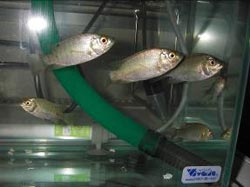Producing artificial bones from fish scales

Copyright : Tokyo Institute of Technology<br>
Toshiyuki Ikoma and Junzo Tanaka have developed technology for producing artificial bones from fish scales and apatite. “Our technology enables the formation of new bone tissues within three months,” says Ikoma. “This is much faster than the six months required using collagen from porcine dermis.” The use of fish collagen also mitigates the potential infection of humans with viruses from pigs. “This new material is very safe,” emphasizes Ikoma.
Other features of artificial bones fabricated by fish collagen and apatite include the finding that (1) the bones have a much higher density and are thereby very strong; (2) the bones implanted into bone defects transform into bone tissue much faster than those using porcine dermis collagen.
“One of our major aims is to use fish collagen for the treatment of bone tumors in older people whose bones take longer to regenerate,” explains Ikoma. “Fish collagen is a material that has the potential of becoming the key material for the development of artificial bones and bone therapy.
In addition to the regeneration of bones from fish collagen, the Tanaka and Ikoma Research group is pursuing projects on nanomedicine and diagnostics. Notably, the Tokyo Institute of Technology group conducts research on tissue engineering and implantable biomaterials in collaboration with medical doctors and biologists. “An interdisciplinary approach with researchers from the medical and engineering fields is very crucial for success” says Ikoma.
In the fish collagen experiments, the researchers have focused on type I collagen extracted from tilapia scales because the scale has little fat and is mainly composed of pure collagen. Intriguingly, Tilapia lives in warm fresh water and the scale collagen shows the highest denaturation (the change of collagen to gelatin) temperature at 36oC, and has no fishy odor.
The Tokyo Tech group has transferred the extraction technology of collagen from tilapia scale to a company. “Interestingly, the structure of collagen fibrils in fish scale is very similar to that of human corneal stroma,” says Ikoma. “So the investigation of fish scale will be useful for the reconstruction of corneal stroma.”
The unique characteristics of fish collagen show potential for the production of cosmetics. “We have already produced cosmetics including the fish collagen,” says Ikoma. “Next, we would like to produce the other products such as cell culture substrates, scaffolds for tissue engineering, and implantable biomaterials.”
References:
Effect of Glutaraldehyde on Properties of Membranes Prepared from Fish Scale Collagen (2012) MRS Proceedings. mrsf11-1418-mm06-04 (6 pages); DOI: http://dx.doi.org/10.1557/opl.2012.396
Zhefeng Xu (1), Toshiyuki Ikoma (1), Tomohiko Yoshioka (1), Motohiro Tagaya (1) , Satoshi Motozukaa (1,2), Rena Matsumoto (3), Toshimasa Uemura (3) and Junzo Tanaka (1)
1 Department of Metallurgy and Ceramics Science, Tokyo Institute Technology University, O-okayama 2-12-1, Meguro-ku, Tokyo 152-8550 JAPAN
2 Department of Mechanical Engineering, Gifu National College of Technology, Kamimakuwa 2236-2, Motosu-si, Gifu 501-0495, JAPAN
3 Nanosystem Research Institute, National Institute of Advanced Industrial Science and Technology, Central 4, 1-1-1 Higashi, Tsukuba, Ibaraki 3-5-8562, JAPAN
Further information:
Hidekazu Ueda and Yukiko Tokida
Center for Public Information
Tokyo Institute of Technology
2-12-1, Ookayama, Meguro-ku, Tokyo 152-8550, Japan
E-mail: kouhou@jim.titech.ac.jp
Tel: +81-3-5734-2975
Fax: +81-3-5734-3661
About Tokyo Institute of Technology:
As one of Japan’s top universities, Tokyo Institute of Technology seeks to contribute to civilization, peace and prosperity in the world, and aims at developing global human capabilities par excellence through pioneering research and education in science and technology, including industrial and social management. To achieve this mission, we have an eye on educating highly moral students to acquire not only scientific expertise but also expertise in the liberal arts, and a balanced knowledge of the social sciences and humanities, all while researching deeply from basics to practice with academic mastery. Through these activities, we wish to contribute to global sustainability of the natural world and the support of human life.
Media Contact
All latest news from the category: Life Sciences and Chemistry
Articles and reports from the Life Sciences and chemistry area deal with applied and basic research into modern biology, chemistry and human medicine.
Valuable information can be found on a range of life sciences fields including bacteriology, biochemistry, bionics, bioinformatics, biophysics, biotechnology, genetics, geobotany, human biology, marine biology, microbiology, molecular biology, cellular biology, zoology, bioinorganic chemistry, microchemistry and environmental chemistry.
Newest articles

Properties of new materials for microchips
… can now be measured well. Reseachers of Delft University of Technology demonstrated measuring performance properties of ultrathin silicon membranes. Making ever smaller and more powerful chips requires new ultrathin…

Floating solar’s potential
… to support sustainable development by addressing climate, water, and energy goals holistically. A new study published this week in Nature Energy raises the potential for floating solar photovoltaics (FPV)…

Skyrmions move at record speeds
… a step towards the computing of the future. An international research team led by scientists from the CNRS1 has discovered that the magnetic nanobubbles2 known as skyrmions can be…





















